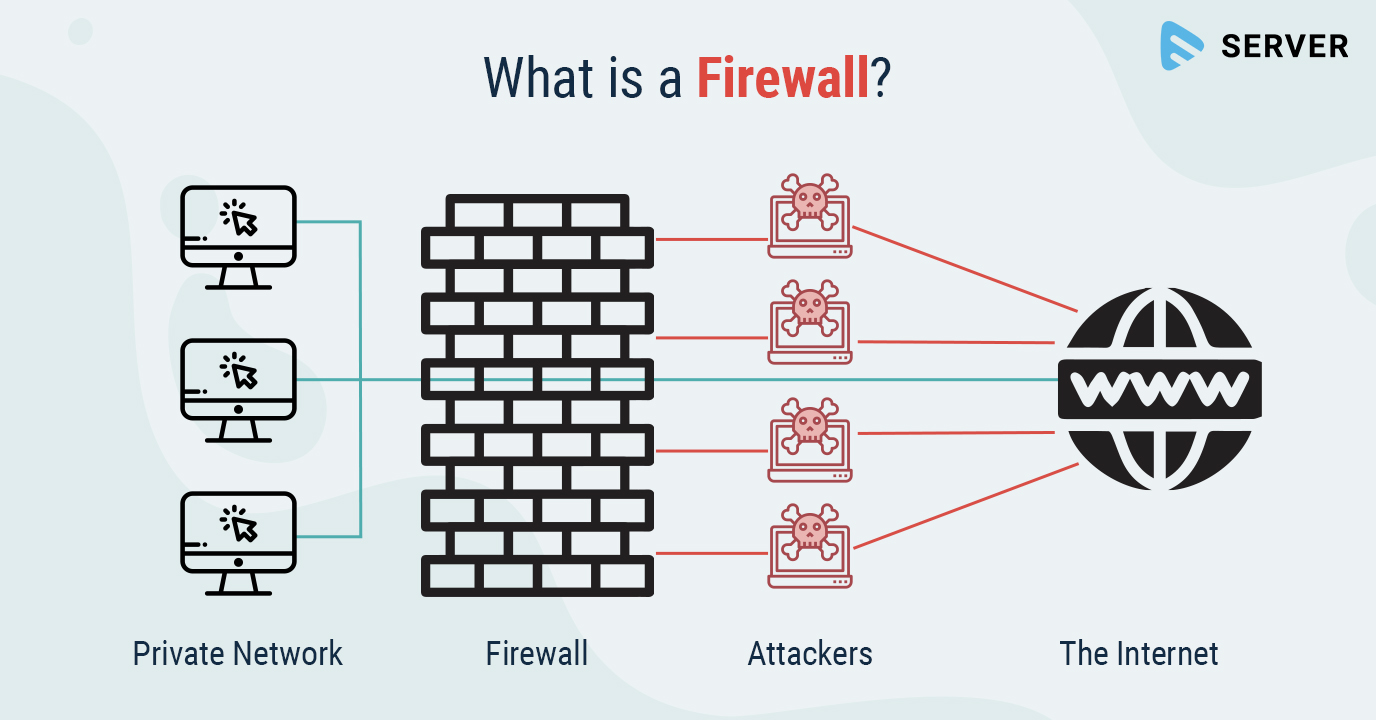With the ongoing pandemic and remote work culture, security threats are on the rise and evolving into more sophisticated forms, leading to enterprises looking for a robust security structure. One of the basics to providing a best-in-class security system is the integration of a firewall. From traditional ones to more sophisticated next generation firewalls, get a detailed analysis of the benefits and types of firewalls to safeguard your business from cyber threats.
What is a Firewall?
A firewall is a software or hardware network security device that monitors incoming and outgoing network traffic and decides whether to allow or block specific traffic based on a defined set of security rules. A firewall generally forms as a barrier between a trusted network and the Internet to protect their network from online threats.
Why are Firewalls Used?
Firewalls are mainly used for security purposes. Acting like a blanket between the internet and a private network, firewalls can intercept incoming malicious traffic trying to attack the network, as well as prevent sensitive information from leaving the network. Firewalls are an extremely important security feature for organizations, especially enterprises that deal with highly confidential data, or creative intellectual property like audio/video content.
Kinds of Firewalls
Proxy Firewalls
An early type of firewall device, a proxy firewall serves as the gateway from one network to another for a specific application. By preventing direct connections from outside the network, proxy servers can provide additional functionality such as content caching and security. However, this also may impact throughput capabilities and the applications they can support.
However effective as it may be, a proxy firewall has a drawback of causing latency, particularly during times of heavy traffic.
Stateful Firewalls
A Stateful inspection firewall is now thought of as a “traditional” firewall that allows or blocks traffic based on state, port, and protocol. Known for monitoring all activities from the opening of a connection until it is closed, stateful firewalls also perform filtering activities. Filtering decisions are made based on both administrator-defined rules as well as context, which refers to using information from previous connections and packets belonging to the same connection.
A stateful firewall rather than inspecting each packet, saves information regarding open connections and uses this information to analyze incoming and outgoing traffic. Due to the fact that these firewalls don’t analyze individual packets, stateful firewalls are faster than proxy-based firewalls.
Next Generation Firewalls
As the name suggests, Next Generation Firewalls are an evolved version of a traditional firewall working beyond simple packet filtering and stateful inspection. Known for ip blocking modern threats such as advanced malware and application-layer attacks, Next Generation Firewalls employ a host of added features such as:
- Application awareness– by virtue of this feature, an NGF is fully aware of which applications are running and which ports those applications are using. This helps in eliminating certain types of malware that aim to terminate a running process and then take over its port.
- Identity Awareness– An NGF can enforce rules based on user identity to eliminate integrated intrusion.
- Deep Packet Inspection- unlike traditional firewalls, NGFs perform deep packet inspection that takes care of things like packet payloads and what applications are being accessed by those packets allowing more granular filtering.
- Breach prevention- NGFs also have advanced capabilities to quickly detect advanced malware if it evades your front-line defenses. It performs activities like prevention to stop attacks, url filtering to enforce policies on millions of URLs and built-in sandboxing and advanced malware protection that continuously analyzes file behavior to quickly detect and eliminate threats
Web Application Firewalls
As opposed to standard firewalls that help protect private networks from malicious web applications, WAFs help protect web applications from malicious attacks. A WAF helps protect web applications by filtering and monitoring HTTP traffic between a web application and the Internet.
Network Address Translation (NAT) Firewalls
Network address translation (NAT) firewalls allow multiple devices with independent network addresses to connect to the internet using a single IP address, keeping individual IP addresses hidden. In this way, attackers looking for a network for IP addresses can’t capture specific details, providing greater security. NAT firewalls are similar to proxy firewalls in that they act as an intermediary between a group of computers in a private network and outside traffic.
Muvi Flex acts as a unified control plane for security across all types of cloud infrastructure. It takes care of your valuable content by providing advanced security measures like server-side security and firewall, protecting the storage and delivery of high-valued & original content to any device.
To host and manage your videos and audios securely and reliably, take a 14-Day Free Trial, now!















Add your comment